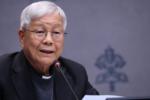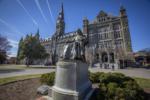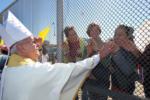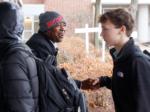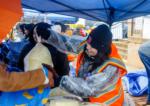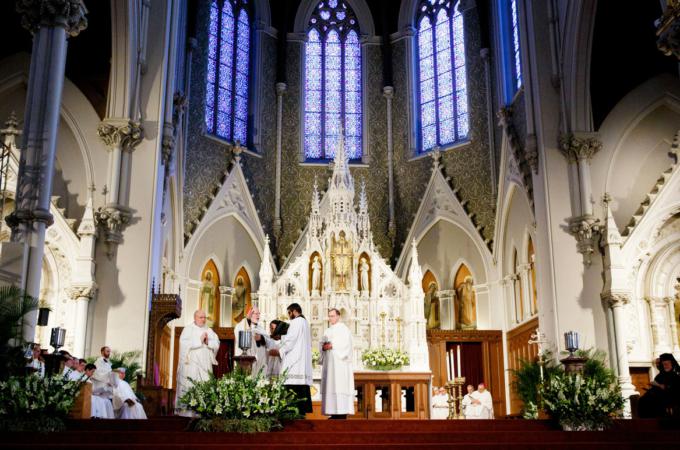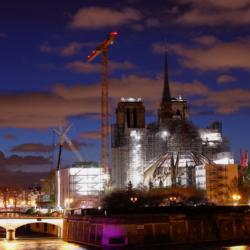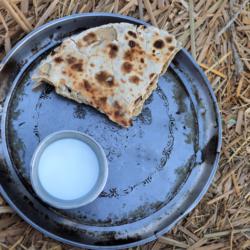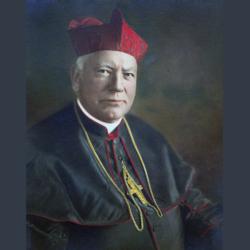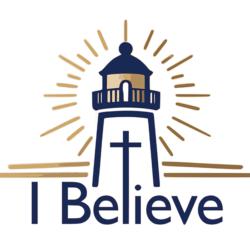Cardinal stresses importance of priests' 'prayer and ministry' at Chrism Mass
SOUTH END -- Priests of the Archdiocese of Boston joined Cardinal Seán P. O'Malley for the annual Chrism Mass, March 22, at the Cathedral of the Holy Cross in Boston.
The Chrism Mass serves as a symbol of unity in dioceses throughout the Catholic world during Holy Week each year, as the local bishop blesses the sacred oils used to administer sacraments for the coming year -- the oil of catechumens, the oil of the infirm and the sacred chrism.
During the Mass, also seen as an opportunity to celebrate priestly fraternity, priests renewed their vows and afterwards attended a luncheon with the cardinal and received oils for their parishes.
A tradition of recent years, and in keeping with the day's theme of unity and fraternity, Metropolitan Methodios, the leader of the Boston Greek Orthodox Church, addressed the priests at the invitation of the cardinal as the Mass began.
"I convey the warm wishes of your Orthodox brethren as you continue your spiritual journey this Holy Week to the life-giving tomb of our savior. May you feel his embrace as you venerate his blood-stained cross, and may you experience the joy of his holy resurrection this Easter," Metropolitan Methodios said.
In his homily, Cardinal O'Malley discussed the importance of the Sabbath and connected it to the ongoing Extraordinary Jubilee Year of Mercy.
"Jesus used the Sabbath; he made it a day of mercy in his preaching and in his miracles to deliver people from bondage. He preached the good news and announced the Jubilee Year. He gave physical sight to a few, but spiritual sight to many. He did not release anyone from physical prisons, but he freed many from spiritual captivity," he said.
The cardinal acknowledged the priests' hard work on the Sabbath Day, "feeding (their) people with the word of life and the bread from heaven," but said the Church should try to do more to assist and preach to the poor.
"In setting our pastoral priorities and plans and strategies of evangelization, let us try to bring the good news to the poor. This was, after all, Jesus' first pastoral priority," Cardinal O'Malley said.
He continued by saying it is the priests' task "to bring liberation to those who are oppressed and captive," noting that some of the "worst forms of oppression and captivity are the addictions that destroy people's lives," in particular, drug abuse.
"Drug overdose is the leading cause of accidental deaths in the United States, with forty thousand lethal overdoses last year... I know that you are seeing this in your parishes," he said, referencing the growing opioid abuse epidemic in the state.
"As men of mercy, we must be present to our people in their suffering. So many people need spiritual healing to be free from the bondage of sin. We have that power to heal, in the confessional and outside of the confessional," said the cardinal.
The Church must continue bringing faith to those immersed in "the darkness of religious illiteracy," he said.
"Christ is the light of the world, and our task is to bring that light to those who are suffering in darkness," said Cardinal O'Malley.
The cardinal ended his homily by speaking on the importance of priests giving equal time to ministry and prayer.
"Priestly holiness is formed in a mutually enriching interaction of prayer and ministry. A priest can never hide from pastoral activity by claiming that his prayer must always take priority, nor, as is more likely in our day, can a priest claim that he doesn't have any time for prayer because of the demands of ministry," he said.
"Without prayer, there is no ministry, only activity. With prayer, every activity becomes an act of love and service, indeed, of prayer," the cardinal said.




